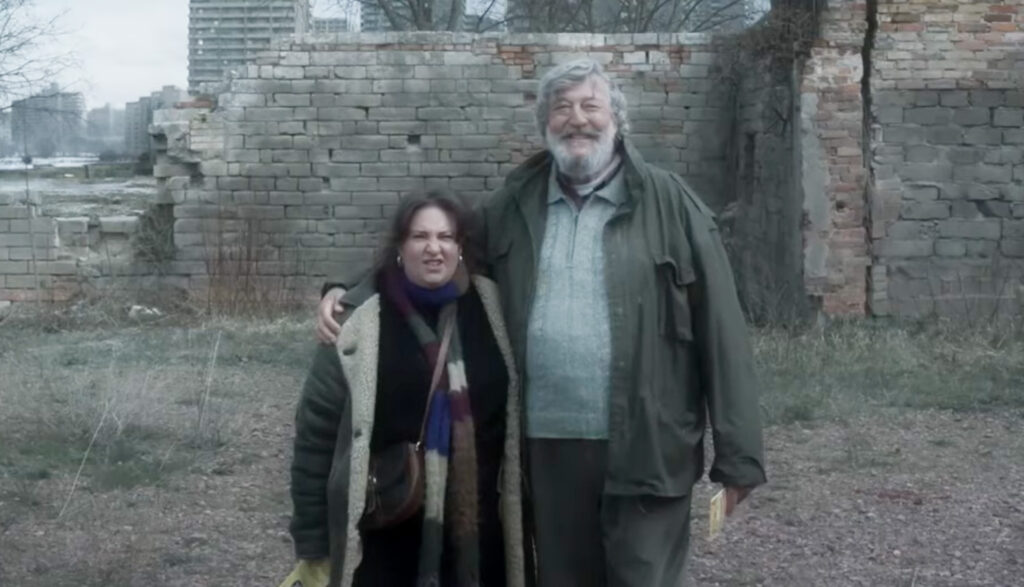
Ruth isn’t sure why she agreed to let her father tag along on her trip to Warsaw. I mean, in a way the trip was all about him and his past. But Ruth knew his presence would make a mess of things.
And of course, it did.
Her dad got lost before their flight even lifted off in New York. Ruth ended up flying without him and having to wait around an extra day just for him to finally arrive. And then when he did get to Warsaw, he wouldn’t board the train—tickets she’d already purchased. Then he started harping on her about her divorce, her empty life, her eating habits. Argh!
What she really wanted was something simple: to go back to where her parents were both raised. She wanted to see their hometown; get a sense of what their world might have looked like. She wanted to understand what it must have been like to be a Jew during World War II and to be shipped off to Auschwitz like her father and his family had been.
Most of all, she wanted to see how she fit into all that twisted history, that misery. How is she connected? Her father, ever large and jovial, never talks about it. Yes, he’ll give her a squeeze and call her Pumpkin, but he never seems to ever tell her how he actually feels about anything.
So here they are wasting the train tickets she already purchased, taking silly side trips to places she didn’t want to go, and arguing about her failed marriage.
Oh, and the cherry on top of it all: She can’t speak Polish. So her father has to talk for them wherever they go!
What a trip.
Ruth eventually sees the things she came to Poland to experience. And those thoughtful moments lead to her and her father, Edek, talking more openly about his past and feelings about her. (Things that he rarely spoke of.) Edek ultimately apologizes for not properly expressing the love he has for his daughter.
A large part of Ruth’s trip focuses on digging into how Jews were mistreated in the 1930s and 1940s. One book she reads coveys the Nazi view of comparing Jews to vermin that need to be exterminated. We hear of how Edek’s family home and business were stolen away, as well as how their family was pulled apart and sent to concentration camps simply because they were Jewish.
All of that said, however, the movie never explores the faith of these Jewish victims. In fact, there’s no indication that the faith of the maligned Jews was even part of the equation.
We see Ruth lying back in a tub of water (one breast and parts of her chest and abdomen are exposed, other areas covered by soap suds.) Ruth wears a revealing tank top and panties on a couple occasions back in her hotel room.
Edek asks his daughter about her sex life, though she cuts the conversation short. Later, Ruth recognizes that Edek has been having sex with an older woman they met at the hotel. (He shows up with the woman, wearing only a robe.)
It’s revealed that in times of stress, Ruth self-harms: She bites her own hand at one point and uses an ink-coated needle to give herself a handmade tattoo.
Edek worries about Ruth going out by herself in Poland. He also talks about Jews being murdered when they returned after the war to tried to reclaim stolen property.
There are more than a half-dozen f-words and five s-words in the dialogue along with a misuse of God’s name.
Ruth smokes throughout the movie, as do a pair of older women whom she and Edek meet. A couple of scenes in a bar feature people smoking and drinking beer and wine.
In her sleep, Ruth feels bedbugs crawling all over her. (When she wakes, she realizes it was just a dream.) Ruth chews up chocolate and spits it back up in an effort to stick to her diet.
When Edek and Ruth visit the home that was taken from his family, the people living there lie about personal items that were left behind. Eventually those residents agree to sell Edek’s family heirlooms for large amounts of cash.
Whatever your relationship with your parents—great, good or not-so-hot—it’s pretty common to wonder about their past. Where did they come from? What have they gone through? And what is your connection to it all—to the history, the experiences, the victories, the struggles? Did you inherit more from Mom and Dad than a lopsided grin and a fading hairline?
Those questions reside at the core of Treasure. The film’s protagonist, Ruth, is a rather unhappy woman who’s trying to find that thread, that connection that will help her understand more about who she is and more about her Holocaust-surviving father’s tormented past.
In that sense, this film can pluck thoughtful and emotional strings for many people.
That said, Treasure feels like a movie that never quite reaches far enough. It doesn’t find its cathartic turn. And at the same time, the dialogue is pointlessly spattered with off-putting crudities as well as a scene including nudity.
Yes, viewers encounter superficial themes of family, healing and forgiveness here. But they won’t find the deeper side of those musings on screen.


After spending more than two decades touring, directing, writing and producing for Christian theater and radio (most recently for Adventures in Odyssey, which he still contributes to), Bob joined the Plugged In staff to help us focus more heavily on video games. He is also one of our primary movie reviewers.